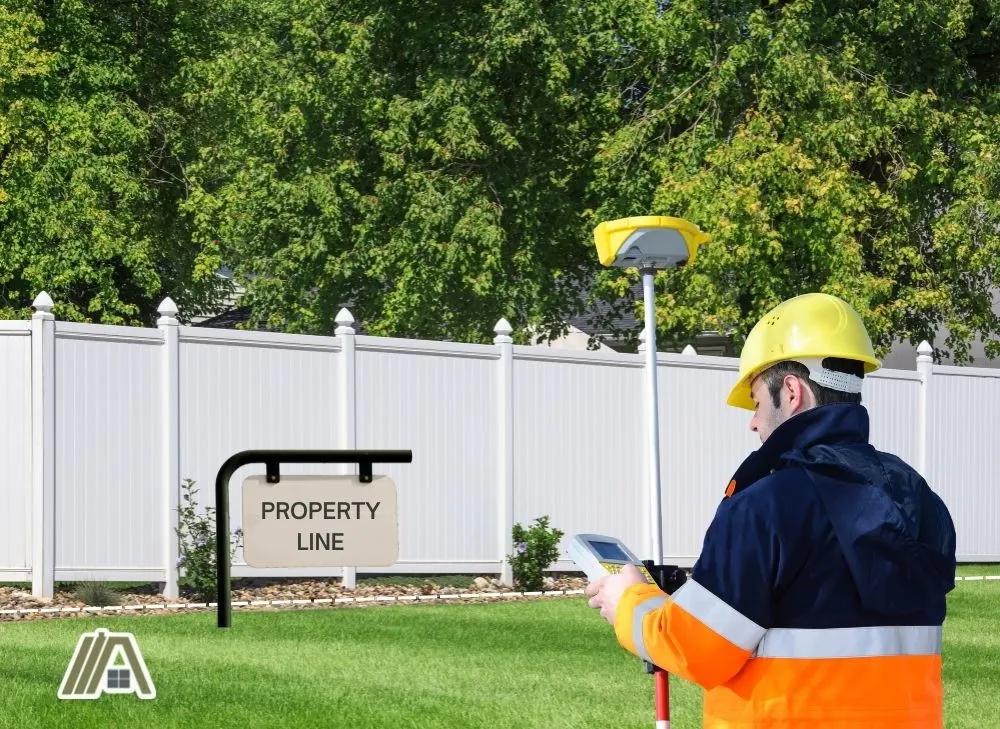It’s a terribly awkward situation to find yourself in—realizing that your neighbor’s fence is encroaching on your property. It’s a few inches, but it’s a few inches of your property, and it’s time to confront them. Depending on how long the fence has been up, it may even be too late.
Neighbors who have portioned off part of your property may end up being able to keep it if you don’t address the situation as soon as you discover it. Still, burning the fence down or shouting accusations at them are not great approaches. There is a way to approach your neighbor and since that is why you came here, I’m going to help you with a few basic pointers.

Start by politely telling the neighbor of the issue. They may not be aware and will happily rectify the matter. If they can’t afford to move the fence, offer a lease or lending agreement. This is vital to counter the adverse possession law. If all else fails, seek legal advice.
Make Sure You Are Correct
What’s worse than your neighbor encroaching on your land? Accusing them of this and realizing it’s not true. As someone who hates being proved wrong, I try to make sure that before I engage in any confrontation, no matter how minor, I have the facts lined up, and they prove that I am correct. Why die on a hill that doesn’t even exist?
In this case, you want to make sure you know exactly where the property lines are. This information would be on the paperwork you received on purchasing the property but you can also call in a surveyor to confirm where the lines actually are.

You would then use this report if your neighbor questions the validity of your claim.
A surveryor might charge up to $500, so you do have to consider if this is worthwhile. If the purchase paperwork included a recent survey, then it’s probably unnecessary. However, if you bought the house from the people who built it 40 years ago, then an updated survey is a good idea.
I have some more information on determining where property lines are in Approaching Your Neighbor About Replacing a Fence.
Have a Conversation With Your Neighbor
Before you come out with guns blazing (figuratively—although literally is an even worse idea), just have a conversation with your neighbor. This is particularly important if you have or wish to have a good relationship with them.
Starting with a formal letter may seem to them like you jumped straight to step 4. Even though you’ve been thinking about it for weeks, when you first approach your neighbor, it will most likely be the first they hear of the matter.
Tell them that you have noticed the fence is on your property. You can wait to see their response. If they are embarrassed and offer to put it to rights at this point, then you are good (provided they are true to their word).

If they don’t make any response to your revelation, then say that you are going to have to ask them to move the fence. Hopefully, they will then feel obliged to put it to rights.
Record the dates on which such conversations took place.
Hopefully, this conversation will forego the need for further action on your part, and you can enjoy your property to its fullest.
Moving the Fence Is Very Expensive
If your neighbor comes to with quotes for moving the fence (showing that they have researched the matter) and explains that they cannot afford to do so, then you can negotiate an arrangement.
Ask them if they would be able to afford the fence if given a chance to save up. If they agree, then you can “lend” them your property until that time. Officially lending them your property is important; we cover why in a later section.
You can also help to pay for the fence to be moved if you would like, but you are not obliged to do so.
If they cannot afford the fence currently and their situation means that they will not be able to move it anytime soon, then you can still lend them the land. Alternatively, you can lease it to them for a reasonable fee.
Make sure that the lending or leasing agreement have a fixed period and/or that there is a clause stating that the agreement must be revisited when your property changes ownership. You don’t want to scare potential buyers off with an indefinite lease of a portion of your property!
Neighbor Makes No Attempt to Move the Fence
Now, there is no guarantee that your neighbor is a reasonable person and even if you have gotten on with them for years, they may feel that moving the fence is not something that they have to do. It’s two inches; why make such a fuss?
You know why it’s important, so try to explain to your neighbor that it affects the value of the property. Perhaps you even want to use those extra few inches if you are building a display flower bed for your prize-winning roses or you want to install a swimming pool and that extra length means you can size up.
If the neighbor still refuses to remedy the situation or your neighbor, who was at first embarrassed, doesn’t actually take steps to move their fence, then you can issue a formal letter.
It shows that you are serious and you are not letting the matter go. You still don’t have to be rude (in fact, you should remain impassive and blameless throughout), but be prepared for rudeness from your neighbor; being wrong and being in denial are powerful agitators of emotion.
Sample Letter
The portions in italics are optional to include or there are multiple options to choose from.
Date _________________
Hello ________________________ (neighbor’s name),
As mentioned in our previous conversations, which took place on ___________________________ (dates you recorded), your fence crosses over onto my property, cutting off ___________________ (amount of encroachment) of my yard.
I’m writing to formally request that we move forward to find a solution to this issue. The aforementioned conversations have not yielded an agreeable resolution.
Losing this portion may seem inconsequential, but it diminishes property resale value should I ever decide to sell and limits what I can do in my own yard. Furthermore, as someone who worked hard to purchase a home for myself, I value the extent of my property.
The best solution and the one which I would like use to pursue first is moving the fence. As it is your fence, I am not obliged to contribute to this process, however, I am willing to pay in _____________ (amount or percentage).
Alternatively, if you are able to provide proof that such a process is prohibitively expensive for you, then I am willing to move on to a lease or lending agreement with fixed terms and periods to which we both agree.
Please consider these solutions and contact me by ___________________ (date, no less than 1 week from today) to discuss how we will proceed. You can reach me on __________________ (phone number), ________________________ (email), or by mail ________________________________________ (address).
Sincerely,
___________________________ (name and signature)
We have also created a pdf version of this sample letter for download.
The Problem Can Become Serious
Even if your neighbors fence only encroaches on your land by a few inches, getting the matter sorted out is important because of something called adverse possession. This is a law that means someone can take ownership of your property without your permission, provided certain criteria are met.
- Continuous possession over 7-20 years.
- Hostile possession, meaning without permission.
- Open possession, meaning there is no attempt to hide the infringement.
- Actual possession, meaning there is clear possession of what is not theirs.
- Exclusive possession, meaning their possession of the property excludes possession by the “true” owner.
If your neighbor refuses or is unable to move the fence, then to prevent this law from taking effect, you need to officially lease or lend that portion of your property to them. This cancels out hostile possession and when even one of the criteria is not met, the law does not apply.
The timeline may seem like a long time, but the clock didn’t start ticking when you bought the house; it started when the fence was built. If you moved into the house after the fence was built, you may not know how much time you have left.
Is It Worth Going to Court?
If you need to use that land (or you are not comfortable with them having a piece of your property) and your neighbor refuses to give it up, then it might be worthwhile to at least seek legal advice, but it will cost you. Legal fees are notoriously expensive. It may be more worth your while to put a lease/lending agreement in place.
However, if the neighbor refuses to sign or acknowledge the lease or lending agreement, then you may need to seek legal advice.
Try mediation before going to court, but your lawyer would be able to advise you in these cases.
Sources
https://www.law.cornell.edu/wex/adverse_possession
https://www.redfin.com/blog/how-to-find-property-lines/
https://www.nolo.com/legal-encyclopedia/terms-lease-rental-agreement-29776.html
